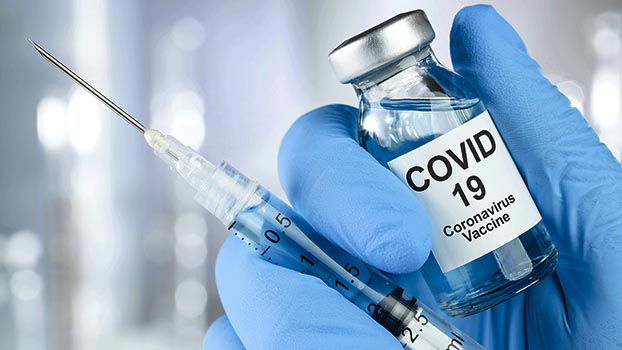Comprehensive Covid-19 vaccination campaign crucial for protecting public health
It is crucial to deploy and engage adequate and skilled health workforce to meet the specific need of rapid rollout in the mids

Dr. Salma Hasan and Dr Ziauddin Hyder
After being identified first in Wuhan province of China on December 31, 2019, globally over 84 million people got infected and 1.2 million died from COVID-19. In addition to unprecedented impact on health, this gravely infectious pandemic has pushed millions away from their livelihood, destroyed businesses including tourism and service industry, and caused endless fiscal deficits. While health consequences are easier to predict, effects on economies are compounded by contextual, situational and political dark spots. In addition, economic consequences would largely depend on the success of ongoing global efforts to roll out COVID-19 vaccines including its timeliness and effectiveness.
We have stepped into 2021, and the gift of the New Year is the release of COVID-19 vaccines that have been developed within an unprecedented short period of time. A number of private pharmaceutical industries began the process of development of COVID-19 vaccine in March 2020, and many of them concluded the third phase of clinical trials and released vaccines within 8 months - by December 2020. What a super fast scientific achievement to control the worst public health disaster of our time! Now, more and more varieties of the World Health Organization approved COVID-19 vaccines are becoming available for mass vaccination. The global community is fully aware that a considerable number of high risk population require vaccine as early as possible and governments have to think out of the box to attain this goal. While routine vaccination programs cover specific group of population including women and children, COVID-19 vaccine needs to cover various population groups for which neither health system not health workforce is prepared. Hence, a substantial amount of work needs to be pushed forward with rapid pace including the mobilization and training of health workforce who would be equip to carry vaccines to the last mile following safety protocols.
The number of vaccine workers that is needed to ensure the success of mass COVID-19 immunization would certainly exceed by manifold the number of available trained and experienced vaccine workers who are available and have been involved in the national routine immunisation programs. This is why it is necessary to take timely decision and rapid initiative to identify, mobilize and train additional health workforce to ensure that COVID-19 vaccines can be deployed and sent to intended recipients without losing time as soon as they are available in country.
Whilst it remains very important that the COVID-19 vaccine workforce receives comprehensive training and their competency is tested and certified to ensure COVID-19 vaccine is given safely and effectively, it is also crucial to engage as many workforce as possible to meet the specific need of rapid rollout in the midst of an emergency caused by the pandemic.
It is necessary to take timely decision and rapid initiative to identify,
mobilize and train additional health workforce to ensure that COVID-19
vaccines can be deployed and sent to intended recipients without
losing time as soon as they are available in country
Workforce who have fairly good potential to be trained include, among others, existing vaccine workers and their assistants, registered nurses, midwives, and other allied health professionals, laboratory technicians, registered or unregistered healthcare support workers, administrative support staff as well as pharmacists, medical, nursing and midwifery students and so on. The training can be delivered in mass scale within short period of time online as well as face to face with initial supervision for the new and unexperienced vaccinators. With experienced workforce extended to most villages in Bangladesh, non governmental organizations can play a significant role in rapid training and deployment of a massive army of COVID-19 vaccine workers.
On the other hand, prioritising population group for COVID-19 vaccination should be above any confusion and controversy not only for maximising patient safety and public confidence but also as the priority of COVID-19 vaccination program is the prevention of mortality which is why the vaccines should be first to give to those who make up 99 percent of preventable mortality.
Frontline health and social care workers are at high risk of acquiring an infection, at high individual risk of developing serious diseases as well as transmitting infection to multiple vulnerable persons or other stuffs in a healthcare environment are considered of higher priority for vaccination than those at lower risk. This prioritisation should be taken into account during vaccine deployment.
In addition to that, age specific cohorts of priority groups are needed to be implemented where older adults and clinically extremely vulnerable individuals who have underlying health conditions that can put them at higher risk of serious diseases and mortality should be on the front of the queue.
We have to remember that for all patient groups, COVID-19 vaccines should not be given to anyone who has suspected or confirmed COVID-19 as well as to them with previously proven anaphylaxis reaction to a vaccine. The vaccine providers should anticipate and be prepared for three medical emergencies associated with the vaccination, and they include, fainting, hyperventilation and anaphylaxis. So all vaccination sites should include minimum of one registered healthcare professional trained in the management of anaphylaxis, cardiopulmonary resuscitation and use of an automated external defibrillator to supervise and train the bigger workforce in action.
A comprehensive COVID-19 vaccination campaign is crucial in protecting public health as well as healthcare workforce and addressing health inequalities; so it is vital to work together with flexibility to achieve maximum outcome of the campaign. At the same time, the ongoing campaign on social distancing, usage of face masks and hand hygiene are equally vital to reduce community transmission of COVID-19.
Dr. Salma Hasan and Dr.Ziauddin Hyder work with Health System Improvement Forum


